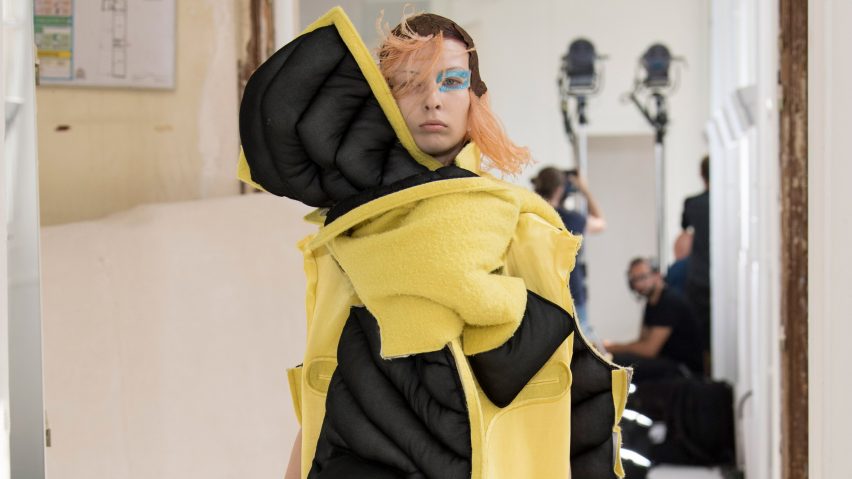John Galliano's Artisanal AW 2018 women's collection for Maison Margiela features layers of sorbet-coloured garments worn back to front and iPhones clamped to model's calves.
Galliano, who has been creative director of avant-garde label Maison Margiela since October 2014, designed the collection for a "new tribe [of] neo-digital natives".
The Artisanal Autumn/Winter 2018 women's collection debuted on 4 July, during Paris Haute Couture fashion week.
According to Galliano, the collection was born from the idea of proposing "a new glamour". This led to the concept of reverse dressing, or reverse swatching, inspired by the way we dress in haste and may put things on back to front.
Through volumes, layers, and various cuts in the fabric, Galliano takes Maison Margiela's characteristic Décortiqué technique of reducing a garment to its core structure a step further, by cutting the image of one garment into another.
The collection obscures the purpose of individual garments, with coats and blazers put on in reverse to become dresses, and capes and skirts cut to be made into tail coats and jackets.
Galliano refers to this transformative process as "nomadic cutting" – evoking the memory of a garment in another garment through a series of swift cuts.
"The nomadic idea of taking life on the road is conveyed in abundant layering where garments interweave and mutate," explained the fashion house. "Here, reverse dressing – a house term – allows for the exchange of pieces conventionally worn as top or bottom layers."
"Through incisions, a cardboard-coloured t-shirt with pin-tuck pleats evokes the motif of a safari jacket," it added.
Throughout the collection Galliano reveals the structures, interlinings and inner padding of clothes, which would normally be concealed, with the aim of showing the inner workings of fashion creation.
"I treat the Artisanal collection like the raw, raw, undiluted essence, the parfum, of the Maison Margiela house," he said.
The collection also took inspiration from Ge Ba, an ancient Chinese recycling method where discarded pieces of fabrics are bonded together with rice glue. This process was used to make the collection's shift dresses.
Many of the items in the collection use modest lining materials like felt and foam in place of fine fabrics.
Galliano says this recalls an image of "nomadic glamour", and also used materials such as bin-liners, stockings, upholstery furnishings and Velcro within the collection.
These more humble fabrics and construction methods are contrasted with futuristic clear materials, featuring x-ray prints by British artist Katerina Jebb, giving the nomadic collection a high-tech edge.
"Delicious and seductive" sorbet colours, such as coral pink, mint green and Yves Klein blue, are accented with high-shine blacks in a bid to refocus the shades that we recognise as pastel – resulting in what Galliano terms "techno-sorbet" colours.
Designed with today's tech-driven generation in mind, the collection saw models walk the runway with iPhone clamps attached to their calves and wrists.
According to the designer, we are all "nomads" in our present day, and we move in "tribes" while being attached to our iPhones and iPads.
The collection is a representation of these tribes that Galliano calls "neo-digital natives."
"Borne out of the contemporary primordial need for constant portable connection, they roam the virtual reality of electronic devices and social media, seduced by curated images of glamour," said Maison Margiela.
"This online illusion provokes a plugged-in desire for authenticity: the artisanal, organic and tactile. A new sense of awareness."
According to Galliano the collection was a way of creating his own world within a world that is currently "very troubled", with layers that are designed to feel protective, but at the same time inviting.
"I asked myself... what does 'cool' mean? I know that when I see people in layers, reflecting the life they lead, or choose not to live, they don't want to live within the confines of society, I think that's cool," said the designer in a podcast.
"When they have their most precious possessions on them, and it's layered and there's a sense of history and emotion to the clothes, I think that's 'cool'," he continued.
The show took place in Maison Margiela's own premises on 163, rue Saint-Maur, in Paris. The set architecture was designed by Dutch architect Anne Holtrop in collaboration with Galliano.
Galliano is not the only designer to fuse tradition with high-tech. Iris van Herpen's latest collection saw traditional weaving techniques combined with high-tech digital fabrication, to create a series of garments featuring complex parametric patterns.

